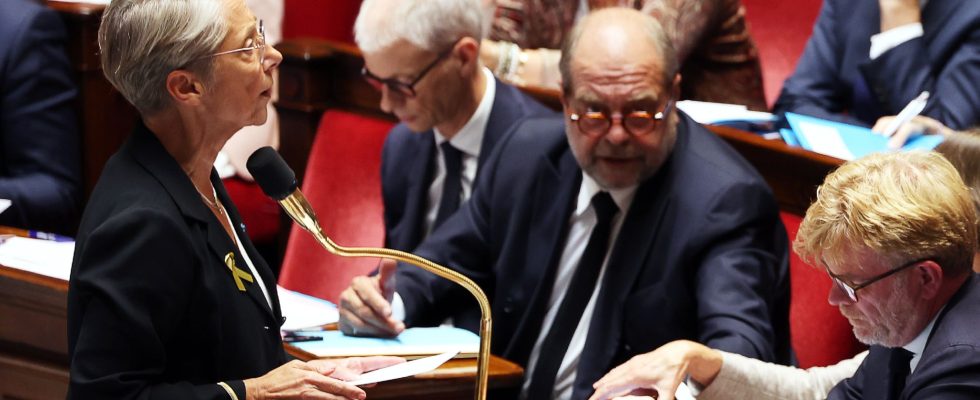The weeks follow one another and look the same… Six months after that on pension reform, Elisabeth Borne drew a new 49.3 on Wednesday, on a public finance programming text, the first appeal of a long list expected in the Assembly this autumn.
“We need this law to program our public finances. We cannot take the slightest risk,” the Prime Minister explained to the Assembly shortly before midnight, before holding her government accountable. This is its 12th use of this tool which, in the absence of an absolute majority in the Assembly, allows it to pass a text without a vote, unless a motion of censure is adopted.
Nupes files a motion of censure
In reaction, the left-wing Nupes alliance immediately announced that it was submitting one, the success of which remains conditional on a vote from the other opposition groups.
“This direction is the worst that has ever been made in our country. 70 billion savings on the backs of the French by 2027,” denounced the president of the La France insoumise (LFI) group Mathilde Panot. “We have a government which is 49.3 dependent”, castigated his socialist counterpart Boris Vallaud, alongside the head of the environmental group Cyrielle Chatelain and the PCF deputy Nicolas Sansu.
The left-wing opposition remains deeply bitter about the use of this constitutional weapon last March to pass the pension reform, in an atmosphere of social and political crisis.
Elected officials from the Les Républicains (LR) party, for their part, should not table a motion and the leaders of the group have so far shown themselves reluctant to vote for censorship of the government on financial texts. “The government must understand that it cannot manage France through 49.3,” declared the president of the independent group Liot Bertrand Pancher.
“We have taken our responsibilities”, retorted the general rapporteur of the Budget Jean-René Cazeneuve (Renaissance), denouncing groups, “diametrically opposed” on financial questions, “but (who) combine only to beat the government” .
A roadmap for the French budgetary trajectory
Oppositions on the left and right once again rejected the idea of supporting the text on Wednesday. Only the National Rally (RN) group had left open the possibility of abstaining. But the presidential camp was in any case reluctant to the idea of a “deal” with the far right.
Distinct from the traditional State and Social Security budgets, the text must serve as a roadmap for the French budgetary trajectory over the period 2023-2027. Rejected by the Assembly a year ago, it notably plans to reduce the public deficit from 4.8% of gross domestic product (GDP) in 2022 to 2.7% in 2027, below the European objective of 3%, in a context where the debt burden is exploding.
Public debt would fall by just under four points, to 108.1% of GDP, still well above the European limit of 60%. An “unambitious” trajectory based on “optimistic” growth hypotheses, criticized the High Council of Public Finances (HCFP) on Monday.
The fact remains that the executive is absolutely committed to the text, arguing that France is committed to providing a trajectory for Brussels to be able to obtain 17.8 billion euros over the period 2023-2024.
He can draw several 49.3
Arguments that most oppositions refute. “Subjecting the disbursement of European credits to the vote of a law results from the sole commitment of the government which no longer knows how to do it”, denounced the socialist Valérie Rabault, considering that the projection of reduction of the public deficit was “unattainable without seriously damaging our economy”.
“Nothing allows us to assert that the absence of adoption would be a sole reason for blocking payments”, and the government “remained free to modify its budgetary policy to find a majority”, insisted the president of the Finance Committee Eric Coquerel (LFI).
But for the government the timing is interesting. The text being examined in extraordinary session, it will still have a cartridge of 49.3 for the ordinary session which opens on Monday. The government can only draw out 49.3 on a single text per ordinary session, excluding State budgets and the Social Security budget, for which it can take responsibility as many times as it wishes.
And Elisabeth Borne will very probably be required to draw around ten 49.3 in the fall from the State and Social Security budgets.
